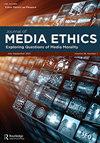Boundaries of Hate: Ethical Implications of the Discursive Construction of Hate Speech in U.S. Opinion Journalism
IF 1.1
3区 哲学
Q3 COMMUNICATION
引用次数: 8
Abstract
ABSTRACT In the United States, hate speech sits at the intersection of ethical and legal debates and has a complex relationship with journalism. The First Amendment provides broad legal protections for hate speech, and U.S. journalists have historically been known for their advocacy for speech freedoms. However, ethical debate persists about the extent to which hate speech should be used within U.S. public discourse. At the nexus of this debate are journalists with intersecting and – possibly – competing duties. This study examines the discursive construction of hate speech in U.S. opinion journalism, analyzing journalistic discourse published in U.S. editorials and opinion columns between 1998 and 2019. The study finds five key themes that, together, indicate the use of hate speech as a means to articulate a libertarian interpretation of public discourse, facilitating a reductionist conception of freedom of expression that does not live up to journalism’s duties to democracy.仇恨的边界:美国舆论新闻中仇恨言论话语建构的伦理意涵
在美国,仇恨言论处于伦理和法律辩论的交叉点,与新闻业有着复杂的关系。第一修正案为仇恨言论提供了广泛的法律保护,美国记者历来以倡导言论自由而闻名。然而,关于仇恨言论应该在多大程度上在美国公共话语中使用的道德争论仍然存在。这场辩论的核心是记者,他们的职责相互交叉,甚至可能相互竞争。本研究通过分析1998年至2019年间发表在美国社论和评论专栏上的新闻话语,考察了美国舆论新闻中仇恨言论的话语结构。该研究发现了五个关键主题,这些主题共同表明,仇恨言论被用作表达自由主义对公共话语的解释的手段,促进了言论自由的简化概念,而这并没有达到新闻业对民主的责任。
本文章由计算机程序翻译,如有差异,请以英文原文为准。
求助全文
约1分钟内获得全文
求助全文

 求助内容:
求助内容: 应助结果提醒方式:
应助结果提醒方式:


